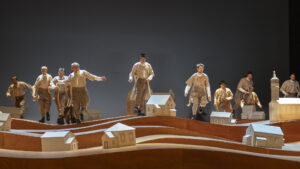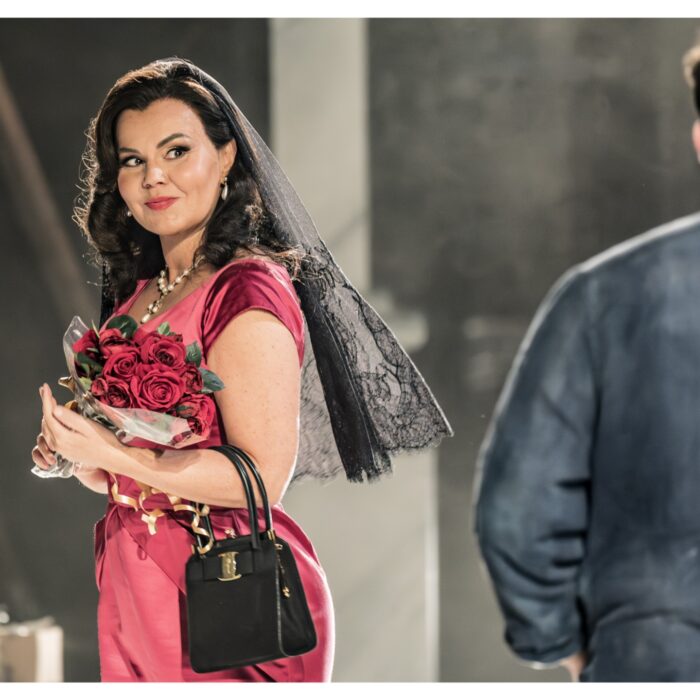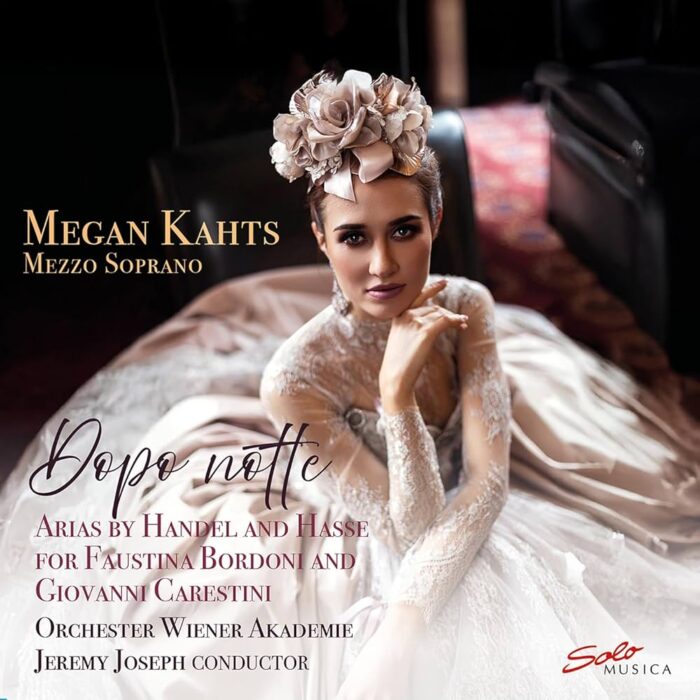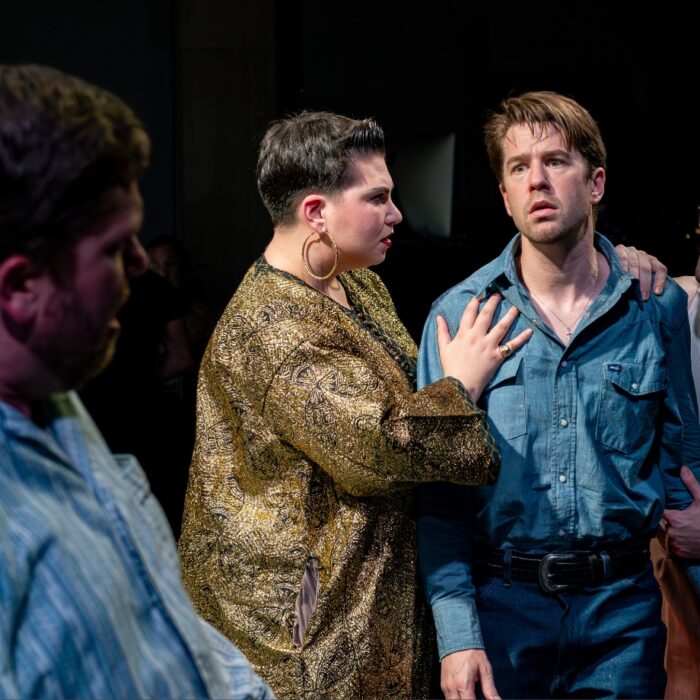
National Theatre Brno 2023-24 Review: The Jacobin
Klecker’s Musically Rich Presentation & Glaser’s Clear Direction Prove the Quality of Dvořák’s Rare Opera
By Alan NeilsonPhoto: Patrik Borecky
“Rusalka,” alone among Dvořák’s operas, has managed to establish itself across the opera world, while his other ten have largely been ignored outside his Czech homeland. One or two have managed to keep a small toehold on the international stage, but only just. It is a strange state of affairs, especially in the case of “The Jacobin.” It might not be surprising that in the Czech Republic it has notched up well over 1000 performances at the Prague National Theatre, but if one considers the positive reception the opera has received when it has been staged in other countries, it is somewhat puzzling. By comparison, Smetana’s “The Bartered Bride,” much like “The Jacobin,” is a pastoral comic opera set in a village among the rolling hills of Bohemia and makes use of the local folk and dance rhythms, however it has suffered no such neglect. Brno Opera’s wonderful current production of “The Jacobin” has only added to the mystery.
The opera, premiered in 1889, is in three acts to a libretto by Marie Červinková-Riegrová. Dvořák, however, was not completely happy with the result and substantially revised the opera in 1897, which included revisions to the libretto by František Ladislav Rieger, the original librettist’s father, and this has become the definitive version and the one used on this occasion.
The narrative, however, is not particularly interesting but is no worse than the usual nonsense that occurs in comic operas. It concerns a count who is in the process of disinheriting his son, Bohuš, in favor of his nephew, Adolf. The count has turned against his son because he does not approve of his wife, Julie, nor of his Jacobite politics. Eventually, it is proved to the count that his son is a fine chap, and Adolf is not such a good soul after all. Add in another love match between Jiří and Terinka, of which her father, Benda, does not approve, along with the Burgrave, who wants Terinka for himself, and the usual ending, in which everything turns out splendidly, and you have the story. It is par for the course for the genre.
Nevertheless, the narrative holds together well, in which each act is neatly constructed, with the work’s overall dramatic shape clearly designed to promote balance and a pleasing forward momentum. There are plenty of opportunities for directors to bring out the comedy, and the drama does include numerous touching moments, particularly in the third act.
It is Dvořák’s music, however, that really makes this an opera worth seeing. His wonderful choral folk melodies, the festive cantata at the beginning of Act two, and the moving individual numbers are all lyrically appealing and possess a sentimental lilt, which fits nicely with the nature of the drama. Again, it is the overall shape that works very well: the first act is awash with folk melodies, but over the course of the opera, the dramatic side of the music becomes more assertive, and the folk element plays a lesser role, which allows the tension to successfully build over the course of the evening.
Glaser’s Clear Direction Successfully Captures the Spirit of the Work
The director, Martin Glaser, was intent on providing a straightforward reading that promoted the narrative without trying to uncover or highlight hidden or tangential themes. So, along with the scenographer, Pavel Borák, they decided on a staging that would reflect the rhythms of peasant daily life and the undulating landscape of the region. Firmly eschewing the idea of green hills, village onion-domed churches, and geese running around outside a village inn, they opted for a wavy, light-brown, pine-colored, tiered stage with small models of white farmhouses, cottages and churches dotted over the surface. The count’s manor house sat on the top tier. A light blue background created the idea of a beautiful summer’s day. Admittedly, this does not sound particularly imaginative or interesting, but it worked exceptionally well. The tiers could be moved up and down to give the stage different shapes and a sense of the changing perspectives of the countryside. It also functioned well by allowing the chorus to enter and leave without causing unnecessary disruption. Moreover, it did give the impression of rolling hills, littered with farms.
The costumes, designed by David Janošek, were not the heavy, traditional folk costumes of the 18th and 19th centuries but lighter abstracted versions, which still, however, managed to retain the essence of the tradition. The principal singers were given costumes with bolder designs that reflected their roles and characters. Adolf and the Burgrave, for example, the baddies of the production, were dressed in yellow and green respectively, and had something of the comic about them. It was never possible to take them really seriously.
In fact, Glaser’s presentation had the feel of a storybook. The singers played out their roles in stereotypical fashion, often with exaggerated movements, without any subtlety. Terinka was a good person pursued by the Burgrave, who was a bad person. Bohuš and Julie were also good people, who would hold hands lovingly as they watched on. The peasants are wholesome, lively and happy. Everything was played out in bold strokes, except for the count in the final act. Cold and aloof throughout the opera, he becomes emotional after hearing Julie sing a fondly remembered lullaby, and his heart starts to melt, and his character softens. It was a well-crafted scene and worked because the characters around him are portrayed in a light-hearted, almost superficial, manner, thereby magnifying his transformation.
Strong Singing Performances that Play Up to Their Characters
Although all the singers engaged with their roles enthusiastically to create clearly identifiable characters, it was their ability to combine as a team that ensured the production was a success. They were attentive to their own roles but were also sensitive to everyone else on stage. There were no standout performances; all the singers played their parts well, both vocally and through their acting.
Bass David Szendiuch produced a convincing portrait of Count Vilém in which he captured his character’s inner pain and strong emotions. For most of the opera, he was a distant, detached figure who interacted only formally with the people around him. However, in the third act, confronted by Benda and then Julie, his memories of his son flood back and he is overwhelmed by emotion, with which he imbued the vocal line. It was his ability to contrast his initial superficial demeanor with his deeply held feelings that made the opera more than just a piece of lighthearted fun.
His son Bohuš was played by baritone Roman Hoza. He portrayed him as a decent, calm, refined young man of good standing, which was reinforced by his staid, middle-class, appearance. He was prone to occasional frustrations; however, Hoza voiced them firmly and never overreacted. His singing was secure and measured with a warm, inviting tone. Even when emotionally roused, he maintained an air of composure and did not allow his voice to overly emphasize or force the point.
Soprano Pavla Vykopalová gave a credible performance as Bohuš’s wife, Julie. She possesses a secure, lyrically appealing voice that is able to move easily into her attractive upper register. Her scene with the count in the third act, in which she sings the lullaby that changes his mood and is followed by a short duet, was sensitively delivered, while her subsequent pleading to the count to forgive Bohuš allowed her to show off the expressive quality of her voice.
As Adolf, the count’s nephew, baritone Tadeáš Hoza was suitably unpleasant in his behavior, although not without an edge of mockery to dampen the impact of the vicious nature of his actions. He possesses a distinctive voice with a pleasing tone in his lower register. He often coated his singing with a demanding, occasionally fierce edge, a must for any serious comic villain.
Bass Jan Štáva was brilliant in his essaying of the Burgrave, playing up the role for all it was worth. In dealing with authority figures like the count or Adolf, he was obsequious in the extreme. When chasing Terinka, he cut a pathetic, foolish figure, and with Jirí, he was threatening and jealous yet cowardly. He lorded it over the peasants with the unpleasant behavior of someone wallowing in their sense of power. Yet, Štáva’s acting ensured that he always verged on the comical, which his green elf-like costume accentuated. His singing was neatly matched to the postures he adopted and was characterized by vocal clarity and expressivity.
Tenor Aleš Briscein, cast as Terinka’s beau Jirí, produced an ardent performance, clearly displaying his love as well as courage in being prepared to face both her father, Benda, who disapproves of him as a potential son-in-law, and the Burgrave, who is forever threatening to conscript him into the army. He has a lyrically resonant tenor, which he successfully employed to voice his passion. Occasionally, he sang with too much volume, which put him out of step with the rest of the cast.
The good-hearted schoolteacher, Benda, had a lot in common with a buffo role in the traditional Italian style: always trying to impose his will on those around him, whether it be the schoolchildren, his daughter or Jirí, he rarely managed to succeed, and was often the butt of other people’s jokes or tricks. The tenor Petr Levícek played the role perfectly; he was often demanding, exasperated and frustrated, which he hammed up to maximum effect. He produced a confident, colorful singing performance in which he showed ability in embellishing the vocal line with emotional infections to heighten the affect. Occasionally, he pushed himself too hard in the upper register and lost a little focus, but it did little to reduce the impact.
Soprano Lucie Kanková was a young, fresh and innocent Terinka, but she knew more than she let on and was quite capable of challenging and manipulating her father. Her voice has a bright, open quality with an attractive upper register and is able to sing with a great sense of freedom. In Act two she showed off the beauty and quality of her voice with a fine rendition of the aria “In autumn’s hazel shrubs,” in which she splendidly captured Dvořák’s pleasing melody. She also has quite a strong stage presence.
Mezzo-soprano Jitka Zerhauová, cast in the relatively small role of Lotinka, produced a solid, clearly sung performance.
It was a marvelous experience watching and listening to the Janáčkovy Opera Chorus singing and dancing its way through the happy, vibrant folk pieces. They were imaginatively and beautifully choreographed, and the chorus master, Pavel Koňárek, oversaw an engaging singing performance, which really brought out the close community relationships, warmth and joy of the peasantry. It was the Act two festive cantata, which included a children’s chorus, however, that really caught the attention. The energy, the depth of the sound, the rhythmic vitality and the clarity of the voices were simply captivating. One might doubt anyone in the theatre could have failed to be moved by their singing.
The conductor, Jakub Klecker, elicited a rhythmically vibrant reading from the Janáčkovy Opera Orchestra, which successfully caught the spirit of the work, especially in its numerous folk-based melodies. Moreover, his handling of the overall musical shape and rich musical textures were expertly judged to ensure that the dramatic tensions and momentum grew steadily towards its Act three climax, yet without ever losing the underlying essential sentimental lilt, which keeps the work from descending into anything too serious.
It was an unexpectedly fine performance of an opera for which one’s expectations were not particularly high. It is a coherent, sentimental work that nevertheless does enough to maintain interest, and Dvořák’s music is so rich in melody that one cannot fail to be charmed. Added to this, the audience was treated to some fine singing from a strong cast, supported by a vibrant reading from the orchestra. It all amounted to a splendid evening of entertainment.



